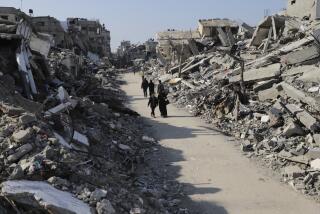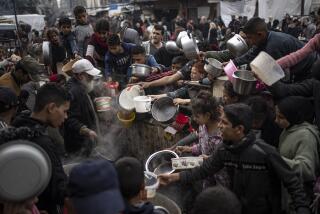British Soldiers Kill 2 Croats as Convoy Attacked
ZAGREB, Croatia — British soldiers accompanying a private aid convoy shot and killed two Croatian militiamen Friday, raising new questions about use of force by U.N. peacekeepers in the widening circle of violence that is enveloping central Bosnia-Herzegovina.
The incident, which came as new battles between Muslim and Croatian forces threatened to spread anarchy throughout the troubled region, is the first officially acknowledged occasion in the 14-month-old U.N. peacekeeping mission in Bosnia that U.N. forces have killed anyone. It sparked new controversy over the role of international peacekeepers whose mandate is largely limited to self-defense and protection of U.N. facilities.
Tony Bucic, a spokesman for the HVO, Bosnia’s Croatian militias, called the incident, in which British soldiers of the U.N. force fired on Croatian gunmen who were shooting at the seven-mile-long convoy near the town of Novi Travnik, “an unprecedented criminal act.” He charged that the U.N. forces were acting beyond their mandate by protecting a private convoy.
Nonetheless, he told reporters in Bosnia, the HVO had issued orders “and the Bosnian Croats will not attack British troops.” Privately, many analysts wondered whether the HVO would be able to make good on such a pledge. Many of its forces are local militiamen who are often beyond the control of headquarters and right now are enraged by the recent territorial gains the Bosnian government’s mainly Muslim forces have won in the fighting in central Bosnia.
“I think the scene has changed drastically. The Croats will, I’m sure, take reprisals on the U.N. and almost certainly on the Brits,” Larry Hollingworth, the United Nations’ former chief of operations in the Bosnian capital of Sarajevo, said in Zagreb.
But other U.N. officials said the international agency’s positive relationship with Croatian forces in recent days, including the rescue by British troops of Croatian civilians who were besieged in a monastery after the central Bosnian town of Travnik fell to the Muslims this week, would probably work against reprisals.
As new fighting around Travnik on Friday broke a cease-fire signed between Muslims and Croats only a day earlier, the convoy, a private mission trying to bring aid to Muslim residents and refugees around Tuzla, was reported stalled. It has suffered at least four attacks during its passage through central Bosnia; as many as eight of its drivers have been reported killed by Croatians, and both Croatian troops and civilians have looted its cargo.
British soldiers, though not officially guarding the convoy, were accompanying it Friday morning when they and the convoy came under fire from Croatian gunmen, U.N. officials recounted.
The British first fired warning shots, which were ignored, then opened up on the gunmen from one of their Warrior armored personnel carriers. Two of the gunmen were reported killed and a third, also hit, was said to have escaped.
“All the tension and anger of the last several days just exploded,” a U.N. spokesman in the Bosnian town of Kiseljak nearby said in a telephone interview. “The convoy itself has actually been broken up, and it’s scattered all over hell’s half-acre now.”
The relief convoy, dubbed the “Convoy of Joy,” is made up of hundreds of trucks--by one account, more than 500--that are now stretched out over seven miles.
It has been traveling for several days on the dangerous road linking the Croatian city of Split with central Bosnia, where vicious fighting between Muslims and Croats has recently shattered a relatively peaceful situation since last fall.
Its difficulties began late Thursday afternoon, when a group of angry Croatian women flowed onto the road and halted the convoy near Novi Travnik. Then Croatian gunmen arrived. As European Community monitors and U.N. officials tried to negotiate its passage, the gunmen attacked, dragging as many as eight Croatian drivers out of sight. Witnesses then reported hearing gunshots and said they saw bodies being dragged away. Early Friday morning, the convoy took some mortar fire in the same area. About an hour later, it came under small-arms fire from members of the HVO, a U.N. official said.
U.N. forces normally guard only U.N. aid convoys, but the British soldiers based in the area felt they had no choice but to accompany this convoy on its troubled journey, one agency official said.
“It’s difficult to ignore 11 kilometers of trucks on the road,” the official said. “It’s an obvious security problem. The forces patrol the route of the convoy, and obviously if there are incidents on that route, they will go to them. This was purely an operational consideration.”
Two British Warrior armored personnel carriers were with the convoy when it was fired on, U.N. officials said.
When their warning shots were ignored, and the gunmen persisted in firing on their vehicles, the Britons fired the fatal volleys.
Only a few hundred yards up the road, Croatian gunmen attacked the convoy again, apparently killing at least one driver and rounding up 30 others. Local residents commenced looting.
U.N. officials said the British troops were clearly acting in self-defense and therefore within their mandate. Croatian forces said the Britons were improperly guarding a convoy of black-market goods destined for Tuzla.
Many U.N. officials, haggling through painful negotiations in recent months to gain peaceful passage for U.N. aid convoys, have dreaded the moment when troops would have to begin firing.
They have feared that with the United Nations’ thin presence and limited mandate, such action would invite violent retribution against peacekeeping troops.
There have been reports, never confirmed, of Canadian U.N. troops firing back at snipers in Sarajevo and killing them.
U.N. officials also are concerned that the use of force by U.N. troops will set a precedent and that every aid convoy may have to shoot its way through blockades, especially those of tough Serbian militiamen in eastern Bosnia.
Nonetheless, the incident may send a message that the United Nations may be changing its attitude when its mission is challenged. Previous deadly attacks on U.N. troops and officials have gone unanswered.
There were no reprisals, for example, when two Danish U.N. representatives were killed June 1 by a Serbian tank shell while they were in a tunnel near Maglaj, even though British forces were present. Nor was there action several days earlier, when three Italian aid workers died at the hands of a roving band of about 30 men wearing Bosnian government uniforms.
“So far, they (the warring parties) have believed quite firmly there would be no retaliation,” said Hollingworth, the U.N. official. “There has been retaliation.”
The incident comes as the U.N. Security Council is debating the use-of-force policy for more than 5,000 additional peacekeeping forces scheduled to be deployed to protect six newly created safe areas for Muslims in war-torn Bosnia.
The United Nations’ mandate to protect civilians in these areas remains unclear. Local Croatian forces have criticized the failure of U.N. troops to protect Croatian civilians fleeing the fighting in Travnik earlier this week when Muslim forces allegedly fired on them with machine guns.
In London, the British government quickly faced criticism from opposition leaders that British forces in Bosnia are too few to protect themselves in the midst of the widening violence. Prime Minister John Major pledged that there would be reinforcements if necessary.
In a new twist in the three-way civil war in Bosnia, Serbs on Friday said they would release and rearm captured Croats so the Croats can fight Muslims in central Bosnia.
Up to 9,000 men--both fighters and civilians--have been held in the prison camp of Manjaca since they were plucked out of a flood of refugees who fled clashes with Muslims around Travnik.
Lt. Gen. Momir Talic of the Serbs’ 1st Krajina Corps said he expected an accord to be reached with Bosnian Croat leaders and the Croatian government to release the prisoners in exchange for about 1,000 Serb civilians and troops held in the southern Bosnian towns of Duvno and Livno.
More to Read
Sign up for Essential California
The most important California stories and recommendations in your inbox every morning.
You may occasionally receive promotional content from the Los Angeles Times.










